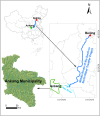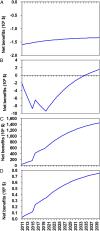Impacts of conservation and human development policy across stakeholders and scales
- PMID: 26082546
- PMCID: PMC4475968
- DOI: 10.1073/pnas.1406486112
Impacts of conservation and human development policy across stakeholders and scales
Abstract
Ideally, both ecosystem service and human development policies should improve human well-being through the conservation of ecosystems that provide valuable services. However, program costs and benefits to multiple stakeholders, and how they change through time, are rarely carefully analyzed. We examine one of China's new ecosystem service protection and human development policies: the Relocation and Settlement Program of Southern Shaanxi Province (RSP), which pays households who opt voluntarily to resettle from mountainous areas. The RSP aims to reduce disaster risk, restore important ecosystem services, and improve human well-being. We use household surveys and biophysical data in an integrated economic cost-benefit analysis for multiple stakeholders. We project that the RSP will result in positive net benefits to the municipal government, and to cross-region and global beneficiaries over the long run along with environment improvement, including improved water quality, soil erosion control, and carbon sequestration. However, there are significant short-run relocation costs for local residents so that poor households may have difficulty participating because they lack the resources to pay the initial costs of relocation. Greater subsidies and subsequent supports after relocation are necessary to reduce the payback period of resettled households in the long run. Compensation from downstream beneficiaries for improved water and from carbon trades could be channeled into reducing relocation costs for the poor and sharing the burden of RSP implementation. The effectiveness of the RSP could also be greatly strengthened by early investment in developing human capital and environment-friendly jobs and establishing long-term mechanisms for securing program goals. These challenges and potential solutions pervade ecosystem service efforts globally.
Keywords: human well-being; payment for ecosystem services; relocation; social–ecological systems; sustainable household livelihoods.
Conflict of interest statement
The authors declare no conflict of interest.
Figures




References
-
- National Development and Reform Commission (2013) [Opinions on Accelerating the Construction of Ecological Civilization] (National Development and Reform Commission of People’s Republic of China, Beijing). Chinese.
-
- Daily GC, et al. Securing natural capital and human well-being: Innovation and impact in China. Acta Ecol Sin. 2013;33(3):677–692.
-
- Ellis F. Household strategies and rural livelihood diversification. J Dev Stud. 1998;35(1):1–38.
Publication types
MeSH terms
LinkOut - more resources
Full Text Sources
Other Literature Sources

